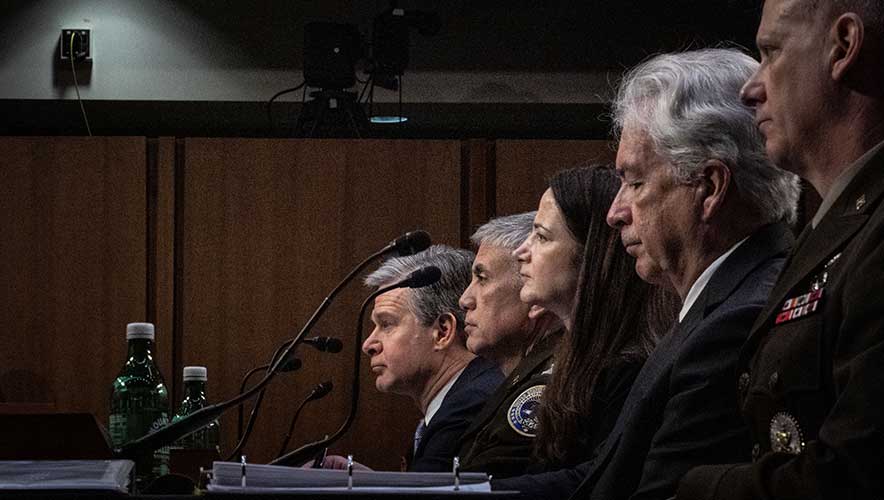U.S. Intelligence Leaders Warn of Geopolitical, Cross-Border Threats
In the coming year, the United States and the nation’s allies can expect to confront two significant, although complicated, strategic challenges to national security, intelligence officials said during a hearing in front of the U.S. Senate Select Committee on Intelligence. The 8 March hearing also provided officials from the Office of the Director of National Intelligence (ODNI), Central Intelligence Agency (CIA), Defense Intelligence Agency (DIA), National Security Agency (NSA), and FBI an opportunity to highlight findings from the 2023 Annual Threat Assessment.
The annual threat assessment—a collection and analysis of insights from the U.S. intelligence community and published by the ODNI—identified these two “critical strategic challenges” as ones that will “intersect with each other and…intensify their national security implications.”
The first concern involves existing world powers and rising regional powers, along with a range of non-state actors, that “will vie for dominance in the global order, as well as compete to set the emerging conditions and the rules that will shape that order for decades to come,” the report said.
Avril Haines, director of national intelligence for ODNI, pointed to both the People’s Republic of China and Russia as nations interested in expanding their reach throughout the region and global influence. During the hearing, Haines said that China is the United States’ “most serious and consequential intelligence rival.”
Haines noted that intelligence experts expect that Chinese President Xi Jinping, who secured a third term in office in October 2022, will use his increasing influence to gain additional significant power over key issues, including Taiwan and challenging Western influence.
FBI director Christopher Wray added that with what China’s intelligence agents target and attempt to steal from other nations, including the United States, technology and cybersecurity have become “inextricably” combined with national security.
“We can no longer just pay attention to who has the most tanks, airplanes, or missiles,” said Senator Mark Warner (D-VA), committee chairman, in his opening statement. “We need to also focus on technology, R&D dollars, strategic investment flows, and supply chains, because whoever leads in technology will have an edge in the national security competition of the future.”
The assessment, said William Hutchinson, CEO of SimSpace, “reveals that the government is increasingly concerned about escalating cyber-threats from nation states….Cyberattacks on nation states such as Ukraine will be used as a blueprint by modern day hackers on a global scale as attacks on critical infrastructure become more hostile.”
The second national security challenge are actually a range of challenges that transcend borders and are expected to converge, such as climate change or Russia’s invasion of Ukraine.
Haines noted that while Putin’s “nuclear saber rattling” is likely more of a show in an attempt to deter additional Western interference, Russia has already suffered significant losses both at home and abroad. Recovery for Moscow will take years, Haines said, meaning that it will increasingly rely on its allies, such as China.
Experts at the hearing added that the Russia-Ukraine war exacerbated cracks in the global economy, already aggravated by the COVID-19 pandemic. The war “raised commodity prices, fueled market volatility, and contributed to food insecurity and financial instability, particularly in low-income countries,” according to the report.
“Despite global backlash over Russia’s invasion of Ukraine, China will maintain its diplomatic, defense, economic, and technology cooperation with Russia to continue trying to challenge the United States, even as it will limit public support,” the report said. “…No country has been immune to these effects,” and these trends are expected to continue through 2023.
Russia and China are also supporting autocratic efforts in other countries, discouraging democracy abroad, according to Haines.
When it comes to convergence, geopolitical tensions are expected to increase or result from increasingly extreme climate effects.
Tensions between India and China and India and Pakistan may increase, and there are possibilities of conflicts between the nations, the US Intelligence Community has claimed in its annual threat assessment.https://t.co/1vZX7y7UBC
— Economic Times (@EconomicTimes) March 9, 2023
“Climate change will increasingly exacerbate risks to U.S. national security interests as the physical impacts increase and geopolitical tensions mount about the global response to the challenge,” the report added. “…As temperatures rise and more extreme climate effects manifest, there is a growing risk of conflict over resources associated with water, arable land, and the Arctic. Additional factors, such as migration, some of which will be exacerbated by climate and weather events, will heighten these risks."
The report also pointed to illegal and unregulated fishing practices, largely from Chinese vessels, that are contributing to overfishing—further straining food security in other regions, as well as threatening marine biodiversity.
Other concerns that the intelligence community and the committee pointed to were artificial intelligence, energy and utilities, and biotechnology. Wray noted that while public-private partnerships and coordination between the two sectors has resulted in sometimes preventing or mitigating intellectual property and other thefts coordinated by Chinese interests, there remains a need to increase such partnerships.











